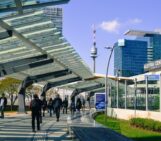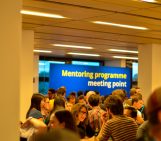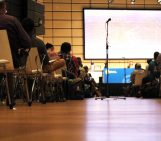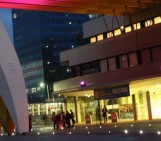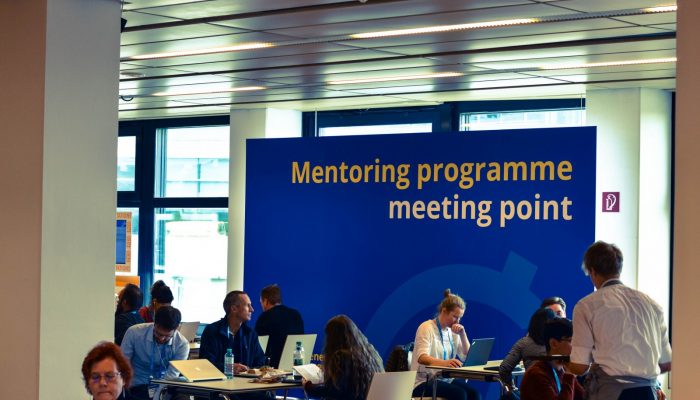
With more than 15,000 participants, 4,700 oral presentations, 11,000 posters and 1,400 PICO presentations, the EGU General Assembly can be an overwhelming experience for any scientist, whether it’s your first time or 10th time attending. However, you can make conference networking a bit easier by signing up for the EGU 2019 Mentoring Programme!
This mentoring scheme aims to facilitate new connections that may lead to long-term professional relationships within the Earth, planetary and space science communities.
Mentees are matched with a scientist who has attended the General Assembly at least two times (mentor). Through this programme, mentees can receive insight on how to navigate the conference, network with conference attendees, and exchange feedback on professional activities and career development.
On the other hand, there are several benefits of being a mentor, including getting to expand your network, trade ideas and share your experience with novice conference attendees, students, and early career scientists.
We’ve asked a few former General Assembly mentors to talk about their experience with the programme and share their highlights. If these interviews inspire you to get involved with our mentoring programme, you can learn more about this initiative, and how to register, here. The deadline to sign up is 31 January 2019.
Stefan Haun, researcher at the Institute for Modelling Hydraulic and Environmental Systems, University of Stuttgart, Germany
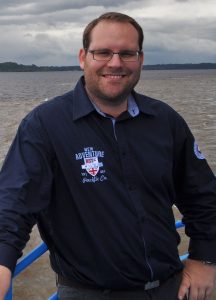
Stefan Haun’s personal highlight of the programme was his mentee’s motivation to learn and discuss new things every time they met.
What motivated you to take part in this programme as be a mentor?
I remembered my first time in Vienna, with so many impressions, a tough schedule for the week in my pocket and finally I almost missed the important things, such as making new contacts and friends. So I wanted to take the opportunity to get in contact with young people, who are for the first time at the General Assembly and to talk with them about possibilities, not only regarding the conference but also regarding their career and share with them my experiences.
What were some of the highlights of your experience as a mentor?
I have to say right from the start my mentee, Prima, was for the first time at the General Assembly in Vienna. She told me also that this was her first large conference and that she was very excited about it. We met a couple of times during the General Assembly and discussed several topics regarding science, networking and of course also on how to navigate through the Assembly. But my personal highlight was her motivation to learn and discuss new things every time we met.
Did you learn something or benefit from being a mentor in this programme? If so, what?
It was nice to meet Prima, a young and very ambitious person. During the year, there is a lot of workload on our desks and sometimes we almost forget about how exciting research is. And suddenly you meet such a young researcher and this motivates you again and you are reminded what a great job we have.
Nilay Dogulu, PhD candidate at Middle East Technical University, Ankara, Turkey
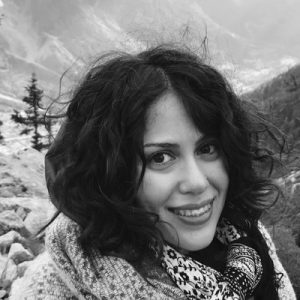
“It will be my third time as a mentor. I really enjoy this experience as it also helps widen my knowledge and insights personally,” says Nilay Dogulu.
What motivated you to take part in this programme as a mentor?
Encouragement and guidance are highly essential to academic learning and development of early career scientists (ECS). Even though the value of these is recognized, opportunities offered to ECS remain limited in many places. Being an ECS can be emotionally challenging due to lack of such opportunities on top of extreme pace of learning as well as high levels of uncertainty about the future. Conferences give ECS the opportunity to interact with their colleagues, including peers. However, it usually takes courage to go beyond our limits and explore new insights. Then a little push to make things easier becomes inevitable. Especially if it is the first time attending a very big conference.
The EGU Mentoring Programme at the General Assembly is a beautiful example of how simple actions can lead to yet effective results for many ECS. I decided to take part in it (first as a mentee, then as a mentor) because I was aware of the lack of opportunities in my university and wanted to help other ECS who can benefit from that little push in the best way. It is all about learning, regardless of age, position, experience, nationality, gender. Being open to learning is a wonderful trait, and the EGU Mentoring Programme gives just the perfect opportunity to support this.
What were some of the highlights of your experience as a mentor?
It is amazing how the algorithm that works behind for matching the mentors and mentees. The matches I was involved with so far were just to the point.
Sometimes mentees can feel unconfident and tend to maintain the distance that arise due to differences (age, position, etc.), eventually making them hesitant to actively participate in the mentor-mentee interaction. I see this as a great loss of opportunity. There is no point in choosing to be alone. A small conversation can spark unexpected yet fruitful ideas having the potential to shape our mindset and bringing in new perspectives!
Did you learn something or benefit from being a mentor in this programme? If so, what?
Learning is the most precious experience. Senior scientists, early career scientists… it doesn’t matter how big the difference between is. EGU attendees are all very friendly and happy to support ECS in their learning journey for one week every spring in Vienna.
I look forward to participating in EGU Mentoring Programme for EGU 2019! It will be my third time as a mentor. I really enjoy this experience as it also helps widen my knowledge and insights personally.
Interviews by Olivia Trani, EGU Communications Officer

